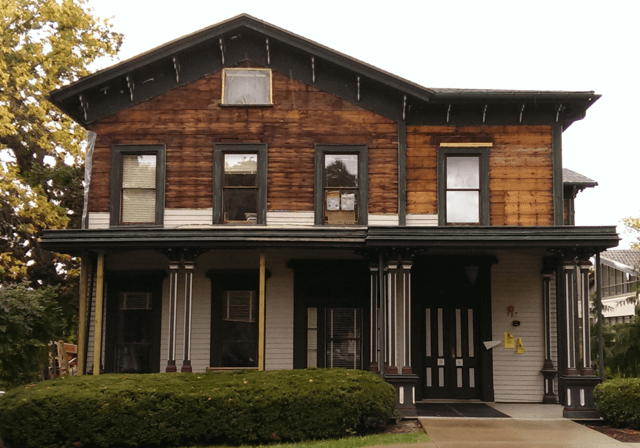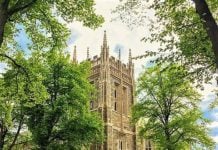The Iowa Writers’ Workshop stands as the defining presence among American writing programs. Founded in 1936, some of the biggest names in American literature have been faculty, students, or both.
Located at the University of Iowa in a grandmotherly Victorian home, the Workshop introduced the model that would launch a boom of creative writing MFA programs across the country. By 1967, enough writing programs existed in the United States to merit the forming of the Associated Writing Programs, the professional organization that unites the numerous writing programs today.
The Iowa Workshop brings together writers of talent for support rather than for education. The two-year program, or “residency,” consists primarily of writing time for a thesis to be delivered at graduation. MFA students enroll in workshops in either poetry or fiction, where they meet in groups of 10 to 15 students for weekly critiques.
A few seminars in craft are available each semester, mostly as Form of Fiction or Form of Poetry. Some students take courses in other University of Iowa departments, particularly theater arts and world languages.
Workshop students often take courses at the university’s Center for the Book, a book arts program with its own graduate programs, but with some ties to the Workshop.
Summer programs at the Workshop offer graduate-level coursework for writers, whether or not they are in a degree program. Manuscript review still governs admission for these classes.
Graduates of the program note the advantages of access to giants of the literary and publishing worlds, not so much for artistic guidance but for help navigating the publishing and critical terrain of American letters.
The Workshop maintains that writing can be cultivated, more than taught, and attributes the success of its alumni to their initial talent, seen by the Workshop during the admissions process itself. The role of the Workshop, as they see it, continues to provide a crucible for the development of American literature among the Workshop’s students and faculty.
Iowa Writers’ Workshop Acceptance Rate

In 2017, LitHub, a website devoted to writing culture, published numbers ascribed to a “University of Iowa representative” that would indicate about a 3.7% rate of acceptance.
That number seems generous, given data from the years 2013-2017, which places the acceptance rate even lower. It’s safe to assume that Iowa usually gets many applications, over a thousand each year, for 25 slots in Fiction and 25 slots in Poetry.
Harvard Law School has an acceptance rate of 12.9%, and Juilliard accepts around 7% of its applicants. Despite the proliferation of MFA programs, the best-known remains extraordinarily selective, most under 5%, as this data from 2013 shows.
Iowa Writers’ Workshop Alumni
As for accepted students who took courses and graduated from the MFA program, short story master Flannery O’Connor may be the most lauded graduate; she earned her MFA in 1947 and won the National Book Award in 1972. She may be the only Iowa alumna featured on a United States postage stamp.
John Irving is an award-winning writer producing novels, nonfiction, and screenplays; he attended from 1965 to 1967.
Michael Chabon’s Master’s thesis for the program became his first novel, The Mysteries of Pittsburgh.
United States Poet Laureates Rita Dove and Joy Harjo graduated in 1977 and 1978, respectively. Award-winning poets James Tate, Robert Bly, and Charles Wright, authors Andre Dubus and Raymond Carver earned MFAs.
Denis Johnson and Gish Jen, groundbreaking novelists, and experimental poets Antler and Barrett Watten, and the unclassifiable Joy Williams attended. Williams graduated in 1965; in 2021, she won the Library of Congress Prize for American Fiction.
Recent alumni like Alexander Chee continue to redefine genre and adopt new ways of delivering literature through media and technology. Chee was one of five program graduates to win Guggenheim fellowships in 2021.
How to Get Accepted to Iowa Writers’ Workshop
The short answer for how to get accepted to the Iowa Writers’ Conference: be insanely, irresistibly good at writing. Applicants should find the best parts of the best things they’ve ever written, and submit those.
The more nuanced answer: for Fiction applicants, the Workshop asks for two stories, not to exceed 80 pages.
More work does not help an application. Submitting the most successful passages, whether it’s a chapter from a novel and a work of micro-fiction, two short stories, or two separate chapters from a novel in progress, presents the best picture of a writer ready to develop their craft.
Writers should include parts of stories, if parts of stories demonstrate their best work. Every page submitted should convey urgency and commitment to the narrative.
Admissions readers look for a singular, undefinable experience when reading applicant submissions; applicants should make every effort to place themselves in the room with readers through their manuscripts.
The poetry submission process parallels the fiction process. Readers look for energy, focus, and commitment to art.
A manuscript of 10-12 poems should include only the work that best features the candidate. It’s far better to have a manuscript that comes in a little short on quantity than to fill in gaps with mediocre work.
No style or genre holds precedence in fiction or poetry; admissions readers seek to bring diverse perspectives to the community.
The Workshop readers emphasize that successful candidates’ work shows spark, originality, and promise, rather than polish or perfection. A successful portfolio submission to the program demonstrates the candidate’s irresistible desire to write.
The application’s statement of purpose can echo the sense of urgency demonstrated in the manuscript, underscoring the applicant’s temperament and dedication to developing their artistic voice. This part of the application won’t help a lackluster manuscript.
No creative writing prerequisites are necessary, and GRE scores are not required. Three letters of recommendation, transcripts, and a CV round out the application materials.
Who Are the Faculty at Iowa Writers’ Workshop?
Given the Workshop’s reputation and profile, the department draws writers from the highest levels of the fiction and poetry worlds, prize-winners and best-sellers. Alumni make up some of the faculty, though nearly any writer might be part of the Workshop for a time.
The current resident faculty include fiction authors like Ethan Canin, Jamel Brinkley, Charles D’Ambrosio, and Margot Livesey, award-winning writers whose work appears in prestigious publications like The New Yorker and The Atlantic.
Poets include Mark Levine, Elizabeth Willis, Tracie Morris, and James Galvin, winners of Guggenheim and NEA fellowships.
Visiting faculty include Kevin Brockmeier, Jenny Zhang, Charles Baxter, Allan Gurganus, Karen Russell, D.A. Powell, Z.Z. Packer, and many other writers representing the vanguard of American literature. Many visiting faculty members spend a semester on campus; some stay a full school year, and many return to campus for additional terms.
Visiting and resident faculty members teach in the summer and online workshops offered by the Iowa Writers’ Workshop. The Eleventh Hour podcast archives recordings of craft talks from writers who have lectured in the Iowa Writers’ Workshop Summer Festival lecture series.
Similar Schools
The Iowa Writers’ Workshop may be the Harvard, Juilliard, and Mayo Clinic of writing, all rolled into one, but the program doesn’t provide the right fit for every writer. Some students find the blank slate of the Iowa prairie as an oasis, a perfect place to create, while others just don’t want to live in Iowa for two years and find the environment at odds with their writing.
Many students do well with Iowa’s workshop, read-around-the-table model. This model dominates writing programs. But many other MFA writing programs offer a host of other options.
Poets & Writers updates its comprehensive guide regularly, and writers’ resource Read the Workshop organizes lists based on the availability of funding, a crucial element for making an MFA program a sensible choice. For the widest vista, Associated Writing Programs’ searchable guide can take you to any of the over 300 writing programs in the United States.
For writers who want a broader program than a summer workshop or conference, but whose lives don’t allow relocation to another part of the country, Low-Residency MFAs can be the best of all worlds. These programs have expanded since the days of snail-mailing manuscripts to faculty mentors; online tools have made them much more immediate and vibrant.
Low-Residency programs often feature excellent faculty, for the same reason they attract serious students: less time on campus means many people in the program have other life commitments. Warren Wilson College and Vermont College of Fine Arts have Low-Residency MFA programs dating back to the days of shipping paper manuscripts to your classmates.
From traditional, high-ranking programs like Columbia and Florida State, to Saint Mary’s College in California with its Writer in the World courses and craft components, every MFA in writing offers different teaching approaches. Climbing in the rankings are schools like North Carolina State and the small, selective program at the University of New Hampshire.
Many schools now offer technical writing, screenwriting, or nonfiction concentrations. Some MFA programs allow students to work in multiple genres, or in new media and performance contexts.
Is Iowa Writers’ Workshop Worth It?
Two chief benefits to attending the Iowa Writers’ Workshop emerge among alumni stories. First, a residency at Iowa sets aside two full years dedicated to actual writing. Students write every day, and they can access critiques and editing formally and informally among the faculty and their cohorts.
And maybe more importantly, the Iowa Writers’ Workshop provides a kind of exclusive guild or club: members have access to a world of critical reception and publisher attention. Selection for the Iowa Writers’ Workshop conveys credibility. That feature can’t easily be quantified, but it’s very real.
Affording the Workshop might be as big an obstacle as the admissions process. In addition to tuition and fees, students will need to live in Iowa those two years. Tuition remission, teaching fellowships, and other aid can help make the program financially accessible.
Not every student will leave with a book contract and a major advance, though the stories of these successes inspire new candidates. Determining whether or not the program delivers value in a practical way depends on access to funding and on the student’s ability to convert those two years into a career post-graduation.
There’s one more benefit, but this one dodges definition even more than claims of credibility and craft. As an art form, writing belongs to the group of solitary activities. Writers almost universally work in private, and audiences read books alone (with some exceptions).
Yet the compulsion to write derives from a longing for human connection, and almost all writers benefit from a community, no matter how small or specialized. Writing programs can provide that community, cracking the isolation for a couple of years, or even a lifetime, as the bonds created in a writing program sustain long after the degree.














